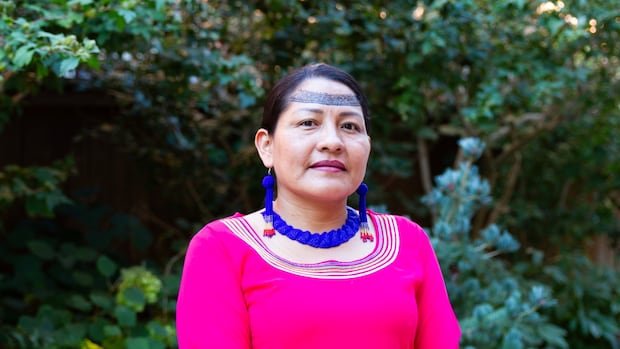Ecuador’s largest native organization promises to fight the now confirmed free trade agreement with Canada, warning that it will promote human rights violations in the environment and culturally different South American country.
In a telecommunications interview with Quito, Jenaya Yasakama, the leader of the Ecuador Natives Federation (Koni), representing 10,000 communities.
“We are not consulted as tribal people. We hope that this process is violated by our rights,” he told the CBC Indigenous in Spanish.
Canada also announced Ecuador The end of the negotiations last week. Amid threats to suppress fees from the United States, global affairs states that Canada’s trade barriers are being removed in bilateral goods and diversification of partnerships.
However, protesters claim that the explanation is opportunistic, and arguing that this arrangement will benefit the miner’s mining industry in 2023 will be a major source of Canadian investment in Ecuador by 2023.
“In our view, in our view, the focus is on expanding mining activities in Ecuador, which will have many destructive impacts,” said Yasakama of Pakayaku of Ecuador Amazon.

“This is our biggest concern. This is why we will oppose it for over 500 years. We hope that there will be more massacre and criminalization when we are protesting.”
The contract is still recognized.
In Ecuador, general elections were held on Sunday, but failed to give a clear winner, which prompted the Runf, the Runfal referendum in April. Opposed to calling Koni “Extraction and New Liberal Policies” From the Conservative-Sieved position, from the Daniel Nobova.
Nobova, the son of a rich banana export high -speed, sought to attract foreign investment shore, declared an internal arms conflict against organized criminal groups, which stimulates Reports of severe human rights violations.
“This is very sad, in fact, it is lamentation that the deal was lamented,” said Hardencia Zagi from her home in Assuwa province in south -Ecuador.
“Our rights have been violated. Our rights under our own Constitution. The President has secretly negotiated with our head, behind our backs, in the hidden way.”
Jagai is a representative of the Victoria Del Ported and Durgwi’s Drinking Water Executive Committee. The group is concerned about the Arsenic transmitting mining operations in the groundwater in the high altitude of the Assuwa province.
“It is very sad to say that Canada respects Indigenous rights, tribal people and human rights. This is wrong because we live another reality,” Jaku said.
Yasakama and Jagi were part of an Ecuador Women’s delegation who toured Canada in the fall, although it is uncertain whether Canadian leaders acted on their concerns. The spokesman for the Minister of Commerce Mary NG did not respond to the request for comment.
In a statement, global affairs include a chapter on tribal and trade in this agreement, which “aims to uphold and improve the rights of Aboriginal people under the applicable law.”
The agreement also includes Canada and Ecuadorian sections that workers, women, or indigenous people should not weaken or reduce the rights of the indigenous people.
Arbitration concerns
Civil Social Groups Also raise red flags Even some of the human rights violations have been accused of adding a controversial system of international referee used by Canadian companies in the past.
“We are angry,” said Latin American Project Coordinator Viviana Herrera in the Mining Watch Canada.
“What represents The document they published Very clear: this agreement is not to protect the investment and protect people. “
Investor-state dispute or arbitration organization called ISDS will allow Canadian companies to sue Ecuador in private tribunals than domestic courts.
Ecuador banned the system in 2008 and rejected it again in the popular vote of 2024. Stuart True, a trade researcher for Canadian policy alternatives, said the organization was side by and unjustly in Ecuador following bad experiences.
“This is actually an anti -democratic, the most incomprehensible organization. It has to go,” he said in an interview.
“If this is opposition, it puts a thumb on behalf of companies – of course in Ecuador. The tunnel has a massive opposition. It can only go bad. This can only go bad for states. This will cause massive, massive cases.”
For example, in the late 2000s, the Ecuadorian government canceled the Copper Messee License, headquartered in Vancouver, after it was accused of trying to improve a plan through intimidation, violence and maneuvering.
Copper Mesa later sued Ecuador through the mediation system. Senior employees in Guito decided that criminal violence against anti -mining groups, but a tribunal was awarded to the company. Million in 2016 is $ 24 million compensation.
In another case, Ecuador canceled a contract with the US -based Oxidant Petroleum Corporation, accused of illegally selling a large stock of a Canadian company to a Canadian company. In 2012, the oxidant was sued for mediation, earning US $ 77 1.77 billion.
True said that the threat of these enormous and damaging cases would give Canadian companies a great potential when plans were not planned.













